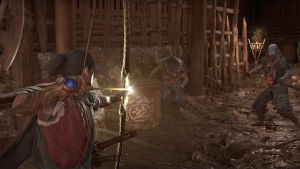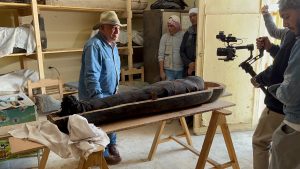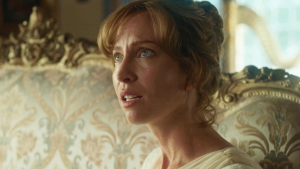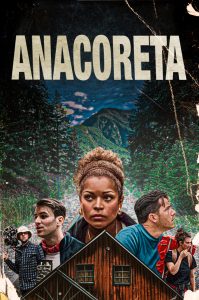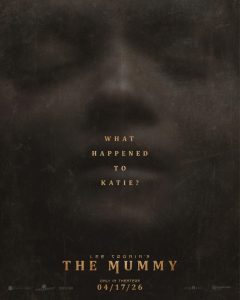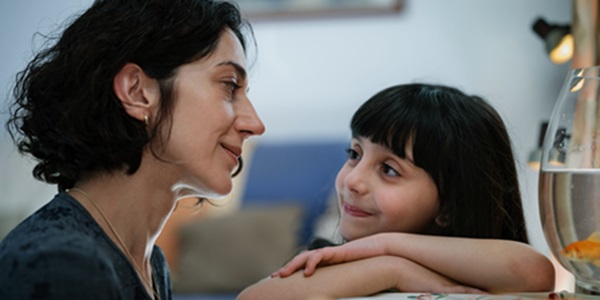
Winner of the Audience Award: World Cinema Dramatic at the 2023 Sundance Film Festival, Shayda marks the powerful and personal feature debut of Australian-Iranian director Noora Niasari. Set in the Iranian immigrant community of Australia against the backdrop of Persian New Year celebrations, the film follows a young mother trying to begin a new life with her daughter away from her abusive husband. Inspired by Niasari’s childhood, complete with a dedication “for my mother and the brave women of Iran” and home movie footage over the end credits, Shayda is a remarkable portrait of feminine resilience and a fitting tribute to the fight for basic freedoms that Iranian women continue to wage today.
Begin Again
Shayda (Zar Amir Ebrahimi, who won Best Actress at the 2022 Cannes Film Festival for her fiery role in the thriller Holy Spider) has moved into a women’s shelter with her six-year-old daughter, Mona (extraordinary young newcomer Selina Zahednia), and, with the guidance of the kindly and empathetic Joyce (Leah Purcell), is attempting to secure a divorce from her husband, Hossein (Osamah Sami). While Shayda and Hossein both initially came to Australia to study, Shayda’s scholarship was rescinded by the Iranian regime, leaving her all the more dependent on Hossein, who subjected her to physical and sexual violence. But when Hossein is granted unsupervised access to Mona for one afternoon each weekend, Shayda becomes increasingly afraid that he’ll abscond with their daughter back to Iran.
source: Sony Pictures Classics
Through snippets of telling conversation, it becomes increasingly clear that one of the central conflicts of their relationship is Hossein’s more traditional and conservative interpretation of Persian culture versus Shayda’s more modern and liberal views. At one point, Hossein tells Shayda that back in Iran, she’d be killed for being a disloyal wife; during another argument, he claims that he’ll allow Shayda to continue to not wear the hijab if she agrees to come back to him. However, it’s not just Hossein who harbors such old-fashioned ideas. Even Shayda’s mother back in Iran encourages her daughter to return to her husband, arguing that the consequences will be worse for her if she does not.
Needless to say, Shayda refuses to listen, even as her reputation among the more conservative members of the Iranian community in Australia disappears into the ever-widening gap between how they expect her to live her life and how she wants to live it. She continues to take small but important steps towards the freedom she desires, from cutting off her hair in the bathroom to going out dancing with the other women at the shelter to getting closer to a new male friend. She also continues to teach Mona all about Persian culture—the language, the music, the celebrations—to ensure that even in this new country, she remembers where they came from. But the dark shadow of Hossein figuratively and literally lurks around every corner, threatening to destroy Shayda’s new life before it has even begun.
Break Free
Shayda doesn’t show us the most graphic scenes of abuse endured by Shayda and Mona, but rather, the lingering aftermath—Shayda imagining Hossein’s face among the crowds of dancers in the club and fleeing in terror, her breaking down in panicked tears as she recalls an instance of rape at his hands to Joyce and her interpreter, Mona waking up from nightmares having wet the bed in fear. This is a sensitive filmmaking choice and the correct one, as it avoids using brutality for shock value while also highlighting how even though the physical scars may quickly fade after a violent outburst, the emotional scars can last for years—even a lifetime.
source: Sony Pictures Classics
These scars are rendered all the more painfully real by Ebrahimi and Zahednia’s incredible performances as mother and daughter; they have such extraordinary chemistry that you’ll almost be convinced that you’re watching a documentary. One cannot help but see aspects of Ebrahimi, who fled her native Iran to start a new life in France after she was threatened with imprisonment due to a scandal, in the character of Shayda; both are progressive, independent-minded women who refuse to let the repressive Iranian regime govern how they live their lives. But even leaving such similarities aside, it is a beautiful performance, full of vulnerability and courage in equal measure. And Zahednia does an admirable job at conveying the sheer horror of a child realizing that one of their parents—one of the people they are supposed to be able to rely on to protect them—is very dangerous. A sequence in which Mona realizes her father is stalking her mother is so rife with tension that it could have been pulled from a spy thriller.
Niasari’s understated direction only adds to the authenticity that infuses every frame of Shayda; time and again, she chooses to focus on the smaller but no less impactful moments in these characters’ lives, many of which involve the women in the shelter coming together to support each other even when they feel their own levels of strength running dangerous low. Niasari ensures we never see these women and their children as mere victims; after all, they don’t let what happened to them define them, so why should we? In what might be my favorite scene in the film, the other women gradually join Shayda and Mona in the living room to dance to one of Shayda’s favorite Iranian videos; as the two of them show the others how they dance in their culture, Mona grabs the hand of a newly arrived young boy and pulls him into the circle, showing him that this is a safe place where he can have fun without fear. It’s a beautiful moment that stands out like a glittering lodestar in the darkness they have all endured.
Conclusion
A touching portrait of personal resistance in the face of violence and repression, Shayda is a standout debut.
Shayda begins screening at Film Forum in New York on March 1, 2024.
Does content like this matter to you?
Become a Member and support film journalism. Unlock access to all of Film Inquiry`s great articles. Join a community of like-minded readers who are passionate about cinema – get access to our private members Network, give back to independent filmmakers, and more.

